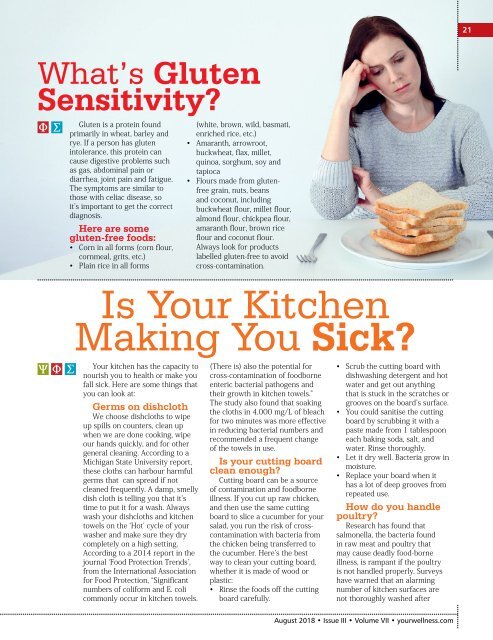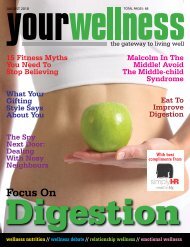Create successful ePaper yourself
Turn your PDF publications into a flip-book with our unique Google optimized e-Paper software.
21<br />
What’s Gluten<br />
Sensitivity?<br />
Gluten is a protein found<br />
primarily in wheat, barley and<br />
rye. If a person has gluten<br />
intolerance, this protein can<br />
cause digestive problems such<br />
as gas, abdominal pain or<br />
diarrhea, joint pain and fatigue.<br />
The symptoms are similar to<br />
those with celiac disease, so<br />
it’s important to get the correct<br />
diagnosis.<br />
Here are some<br />
gluten-free foods:<br />
• Corn in all forms (corn flour,<br />
cornmeal, grits, etc.)<br />
• Plain rice in all forms<br />
(white, brown, wild, basmati,<br />
enriched rice, etc.)<br />
• Amaranth, arrowroot,<br />
buckwheat, flax, millet,<br />
quinoa, sorghum, soy and<br />
tapioca<br />
• Flours made from glutenfree<br />
grain, nuts, beans<br />
and coconut, including<br />
buckwheat flour, millet flour,<br />
almond flour, chickpea flour,<br />
amaranth flour, brown rice<br />
flour and coconut flour.<br />
Always look for products<br />
labelled gluten-free to avoid<br />
cross-contamination.<br />
Is Your Kitchen<br />
Making You Sick?<br />
Your kitchen has the capacity to<br />
nourish you to health or make you<br />
fall sick. Here are some things that<br />
you can look at:<br />
Germs on dishcloth<br />
We choose dishcloths to wipe<br />
up spills on counters, clean up<br />
when we are done cooking, wipe<br />
our hands quickly, and for other<br />
general cleaning. According to a<br />
Michigan State University report,<br />
these cloths can harbour harmful<br />
germs that can spread if not<br />
cleaned frequently. A damp, smelly<br />
dish cloth is telling you that it’s<br />
time to put it for a wash. Always<br />
wash your dishcloths and kitchen<br />
towels on the ‘Hot’ cycle of your<br />
washer and make sure they dry<br />
completely on a high setting.<br />
According to a 2014 report in the<br />
journal ‘Food Protection Trends’,<br />
from the International Association<br />
for Food Protection, “Significant<br />
numbers of coliform and E. coli<br />
commonly occur in kitchen towels.<br />
(There is) also the potential for<br />
cross-contamination of foodborne<br />
enteric bacterial pathogens and<br />
their growth in kitchen towels.”<br />
The study also found that soaking<br />
the cloths in 4,000 mg/L of bleach<br />
for two minutes was more effective<br />
in reducing bacterial numbers and<br />
recommended a frequent change<br />
of the towels in use.<br />
Is your cutting board<br />
clean enough?<br />
Cutting board can be a source<br />
of contamination and foodborne<br />
illness. If you cut up raw chicken,<br />
and then use the same cutting<br />
board to slice a cucumber for your<br />
salad, you run the risk of crosscontamination<br />
with bacteria from<br />
the chicken being transferred to<br />
the cucumber. Here’s the best<br />
way to clean your cutting board,<br />
whether it is made of wood or<br />
plastic:<br />
• Rinse the foods off the cutting<br />
board carefully.<br />
• Scrub the cutting board with<br />
dishwashing detergent and hot<br />
water and get out anything<br />
that is stuck in the scratches or<br />
grooves on the board’s surface.<br />
• You could sanitise the cutting<br />
board by scrubbing it with a<br />
paste made from 1 tablespoon<br />
each baking soda, salt, and<br />
water. Rinse thoroughly.<br />
• Let it dry well. Bacteria grow in<br />
moisture.<br />
• Replace your board when it<br />
has a lot of deep grooves from<br />
repeated use.<br />
How do you handle<br />
poultry?<br />
Research has found that<br />
salmonella, the bacteria found<br />
in raw meat and poultry that<br />
may cause deadly food-borne<br />
illness, is rampant if the poultry<br />
is not handled properly. Surveys<br />
have warned that an alarming<br />
number of kitchen surfaces are<br />
not thoroughly washed after<br />
<strong>August</strong> <strong>2018</strong> • Issue III • Volume VII • yourwellness.com




